Endometriosis Surgery: My Experience with Excision Surgery
I recently had surgery for Endometriosis by excision. Here is a detailed recollection of my experience thus far – including why I wanted excision over ablation, my recovery (so far), and more.
Surgery for Endometriosis
I recently had surgery to first diagnose endometriosis and, after it was found, remove the tissue via excision.
In the weeks leading up to this surgery, I read everything I could – every Facebook post, every article… I wanted to know everything.
However, in the process, I discovered there weren’t a lot of in-depth posts from people who have gone through the surgery. Since my experience is very fresh, I thought I would share my experience, and why I chose excision over ablation.
I’ve pretty much been stuck in bed for the most part, so I have nothing better to do than write this all out. I do hope that this will help any of you worried about the surgery and what to expect.
(funny side note – I was getting really shaky/nervous before the surgery, and one of my nurses said, “Try not to think about the surgery. Try to think about how you can write about this on your blog afterward! It made me laugh).
BE SURE TO JOIN OUR NEW FACEBOOK GROUP – ENDOMETRIOSIS SUPPORT SISTERS.
What is Endometriosis Excision
When I first thought of endometriosis, I automatically thought of ablation, or burning off. This is what I had heard of others doing, and I thought it was the gold standard for surgical removal of endometriosis.
However, as I started doing more research, I discovered that the real gold standard for removal of endometriosis is with excision.
What’s the difference? Simply put, ablation is like pulling at a week and only getting the tops. Excision is removing a weed from the roots. It is far less likely to come back when it is removed entirely. I thought this article did a great job explaining the two.
Unfortunately, excision requires more expertise, and there aren’t a ton of doctors that are skilled in it – I believe I read only around 150 in the United States. Many women don’t find relief from endometriosis because they go to well-meaning physicians who just don’t have the experience it takes to identify and remove endometriosis in its complexity.
Because I heard one too many stories of women going to their regular OBGYN and it being missed, only to be covered in endo that was discovered by a specialist, when I started to suspect I had endometriosis, that is the route I decided to go.
When it comes to picking your provider, just do your research and decide what’s best for your situation.
There are no guarantees or cures for endometriosis – however, excision surgery has around an 80-85% chance of preventing Endometriosis from coming back, and many women who have this surgery to help with fertility are able to conceive after. I’m cautiously optimistic that this will help with my pain long term and allow us to get pregnant again.
But it is important to know that it is not considered a cure.
But again – do your research and determine what is best for your situation. There are many ways to treat endometriosis, and you need to choose which one is right for you.
Endometriosis Excision Specialist
I think the a good place to look for a specialist in this Facebook Group – Nancy’s Nook Endometriosis Education. The group is extremely helpful in navigating this disease, and the list of doctors is helpful. They’ve been vetted and shown to have expertise.
However, be aware that there are very good doctors elsewhere that may not be on this list for one reason or another. This group is also not a discussion group, so if you are looking for something like that, it’s not the place to go. It does have a lot of good resources though. I think the best thing you can do is ask for local recommendations from women suffering from endo as well.
I am fortunate to live just an hour from a specialist. I joined a local Endometriosis support group, and everyone in that group absolutely raved about this doctor, so I knew he’d be a good choice. And while sometimes it seems annoying to have to drive that far, many women travel much further.
The best advice I was given before my initial consult was to let the doctor lead the discussion. Of course, bring a list of any concerns you might have, but when you go in, let them ask the questions. I found that this helped us get to the point more quickly.
I felt a lot of compassion and understanding during my initial appointment, which reaffirmed my decision to go to this particular doctor. Anyone who suffers from chronic pain understands how frustrating going to the doctor can be, and I felt so much relief after my consultation.
I really felt like he knew what he was doing, I trusted his diagnosis, and I appreciated his approach to my situation. Because we have been wanting to get pregnant, he encouraged us to keep trying for a while, until I felt that the pain was too much or I didn’t get pregnant. He didn’t push me into surgery, though he did say it was a matter of having it now or later – it was inevitable either way. In the end, I decided about a month afterward to call and schedule for surgery. I felt like I could always cancel if I did get pregnant (and I did – but the pregnancy sadly ended up an early miscarriage), but it would be better to have it on the books rather than keep trying for another six months to get pregnant, realize I wasn’t going to get pregnant, and then have to wait.
Most of the time with excision specialists, there is a long waiting list. Here is an overview of the timeline:
- March: Called to make an initial appointment – scheduled for mid-June
- June: Initial consultation and physical exam
- End of July/Early August: Called to let them know I wanted to surgery
- Beginning of September: Surgery scheduler called; they actually had surgery available two weeks after that call, as well as a month after, but we had trips scheduled around the same time, so we opted to be scheduled for the end of October. I was shocked that they had this availability because everyone I had talked to said this doctor was usually scheduled three months out for surgery
- October 24th: Surgery
Fears Before Endometriosis Surgery
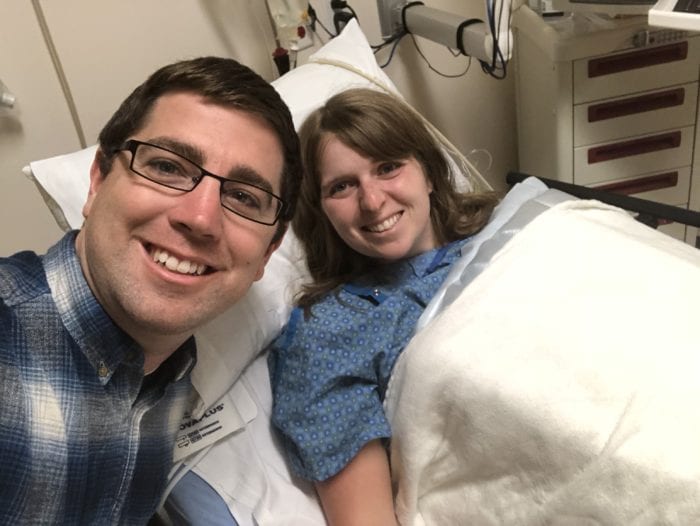
It’s normal to have fears before you get any type of medical procedure done – especially when it’s surgery.
I was terrified leading up to just the hour before my surgery. Much of the fear of surgery has been fueled by my love of medical shows – which, are obviously totally unrealistic – but it can make you feel more aware of the risks associated with surgery.
But more than the fear of my surgery was the fear that the doctor wouldn’t find what he was looking for.
It may seem strange to hope they find something wrong with your body – especially something like endometriosis, which is incurable. However, struggling with your health and not having any answers is so hard.
To know what’s wrong with you – and to have a plan on how to help you – is invaluable.
I’ve had many tests done in the past – blood tests, colonoscopies, CT scans, MRIs…the galore. And they always came back normal. Obviously, it was great that I wasn’t plagued by anything lethal, but the pain is a sign that something is wrong – and not knowing what that is can be very distressing.
After Oliver was born, I started having different symptoms than I had in the past, and I wasn’t sure what path to take.
Although my doctor was confident that he would find endometriosis, it was very nerve-wracking for me leading up to the surgery. Because if they didn’t find anything, I wasn’t sure if I’d ever find out what was wrong.
As I’ve shared these anxieties in Facebook groups, I know that I’m not alone. So I thought it was important to share those fears I had, so if you are reading this in preparation for excision surgery – you can know that you aren’t alone. But also don’t let it hold you back. I kept feeling tempted to cancel the surgery, but I’m so glad I didn’t.
Endometriosis Surgery: What to Expect
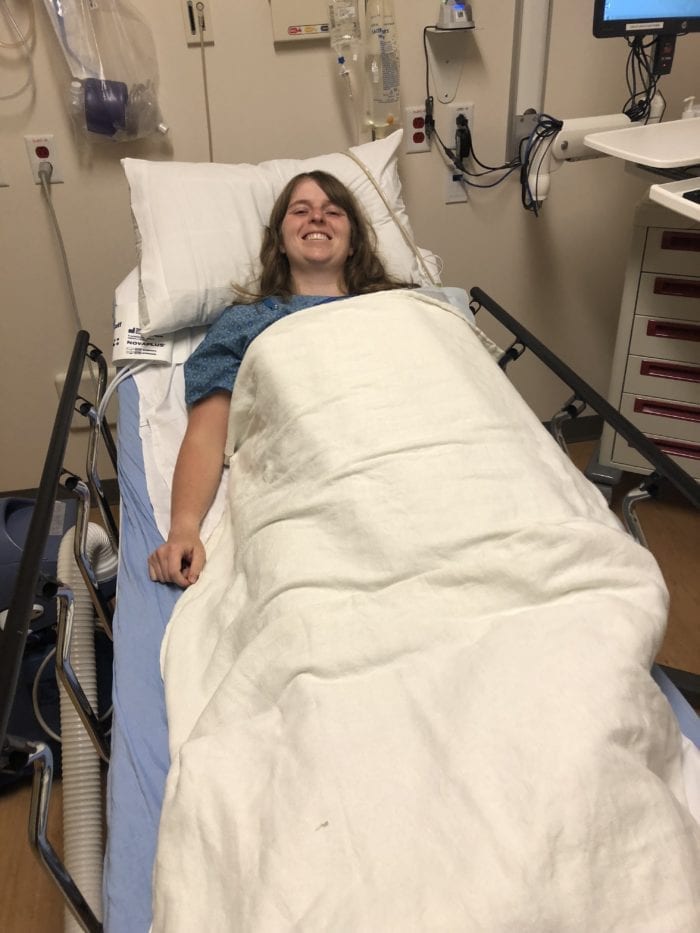
Before You Go In
You will receive instructions from your doctor and/or anesthesiologist before your surgery date on how to prepare for surgery.
In my situation, I received a phone call from an anesthesiologist nurse about a month before my surgery. She went over my health history and asked me A LOT of questions. After that, she instructed me on what medications and supplements I could take in the week before my surgery (I had to pretty much stop all vitamins, and I couldn’t take anything like ibuprofen or naproxen).
I was also given information on “surgical showers” that I had to take starting three days before my surgery.
Finally, I was given instructions on fasting. I would imagine this will be different depending on the time of your surgery, but I was told that I had to start fasting by midnight, clear liquids until 5 AM, and then only water until 11 AM, which was three hours before the surgery. Again, make sure you verify that schedule for this, as it’s very important!
A friend of mine who had excision surgery told me her doctor recommended she be on a liquid diet the day before, and soft food diet for a few days before that, to help with bowel movements after that surgery. I’ll admit, I didn’t do this, and I’ve been okay. However, my endometriosis wasn’t found on the bowel, so if it had been, I may be regretting this right now.
Just make sure you write all of this information down. I didn’t, and I forgot pretty much all of it within a day after I spoke with her. I was at Chick-fil-A when the nurse called, so I didn’t have a good place to write things down, but I should have written it down immediately after.
Pre-op
My surgery was set for 2:00, and I was told to be there at 12:30. I arrived at around 12:15.
DO NOT go to the bathroom right before you go back to pre-op. I couldn’t hold it (because I had finished chugging some water at 11 AM), and I did…and apparently, they had to take a pregnancy test. The nurse was really stressed out about this (though when my doctor came in, he kind of rolled his eyes about it, since we both knew I wasn’t pregnant). However, I was able to give a sample shortly before surgery because of all the IV fluids they gave me…and guess what, it was negative!
I get why they have to do it though. Going under anesthesia while pregnant is not usually a good thing.
ANYWAYS. Pre-op. When I first got to pre-op, they immediately had me take off any jewelry (including my wedding ring), and change into a lovely hospital gown.
They then had me put on compression socks for surgery, and then I put on another sock over that. On top of those, they put a plastic thing that would be hooked up to a machine during surgery that would provide compressions throughout the surgery. Both of these measures were done to help prevent blood clots during surgery.
I then I had to swab my nose out with some q-tips that had some kind of solution on them – two times per nose for 30 seconds each.
I had to get an IV placed, which took awhile. I have pretty deep veins, and despite bringing in their best nurse to do it, it took about 20 minutes and two tries. They joked that I was famous now for stumping this nurse. It made me laugh.
After that, I was given four different medications. The only one I remember is 1000 mg of Tylenol. They just told me the others targeted a specific kind of pain. One of them turned my urine orange, which freaked me out – despite them telling me it would happen. I thought I had blood in my urine at first!
I don’t know what it was about those medications, but one of them made me kind of loopy. The longer it was in my system, the loopier I got. By the time they were taking me back to the OR (before they gave me a medication that was meant to relax me), I was saying weird things and asking Forrest to come to the OR with me – even though I obviously knew that he couldn’t!
About 20 minutes before the procedure began, my doctor came in and said, “So I’m here to take out your tonsils…” which put me at ease. Obviously, he wasn’t there for that. He even admitted he wasn’t sure he’d know what tonsils looked like, to which I said, “Well, it’s a good thing that’s what I’m not here for!”
He had me sign a consent to treat form, looked over my chart, and let me know that I was going to be okay and that they’d come to see me soon. It helped my anxiety a lot to talk with him shortly before the procedure began.
I also had a surgical assistant come in and have me sign a piece of paper, and finally, the anesthesiologist came in. He asked me lots of questions, and he kept making me laugh. He was so kind, told my husband they were going to take real good care of me, and even told me that he got nervous before his recent surgery. I really felt at ease.
Right before they took me back, they gave me a medication that was supposed to help relax my nerves. And that it did. It started working immediately, and I started saying all sorts of things. I remember saying, “Wow, the operating room is so bright. Is it supposed to be like that? It seems so dark on TV.” Haha.
They wheeled me in, I remembered saying my name, why I was there, and then I dozed off before they could even start the anesthesia. The next thing I knew, I was groggily waking up in recovery.
Operation
Obviously, I don’t remember anything about the surgery. If I did, that would be a problem!
My surgery was about 1.5 hours long. The length of time for surgery will vary largely on what they find and what they are doing. Some women go in for a hysterectomy along with their excision, which will obviously add time. Some people have more complicated cases of endo – it may be on more sensitive organs, it may be deeper, or the organs may be stuck together.
However, he told us beforehand he predicted it would be about 1.5 hours, and that was pretty accurate down to the dot.
My doctor used the DaVinci robotic surgery system for my surgery. There were four incisions made in my abdomen.
I definitely recommend requesting your surgical notes afterward. Many women aren’t able to talk with their doctor afterward, so it’s helpful to be able to read these. I was able to see mine immediately on the patient portal for the hospital.
My doctor said he found endometriosis “everywhere that they typically find it.” It wasn’t as serious as some cases, but it was definitely there and the most likely culprit for my pain. It was on the posterior and anterior cul de sac, both ovarian fossa, the ureters, and on the uterosacral ligaments. He also found some ovarian cysts (not endometriomas), which he also excised.
Recovery
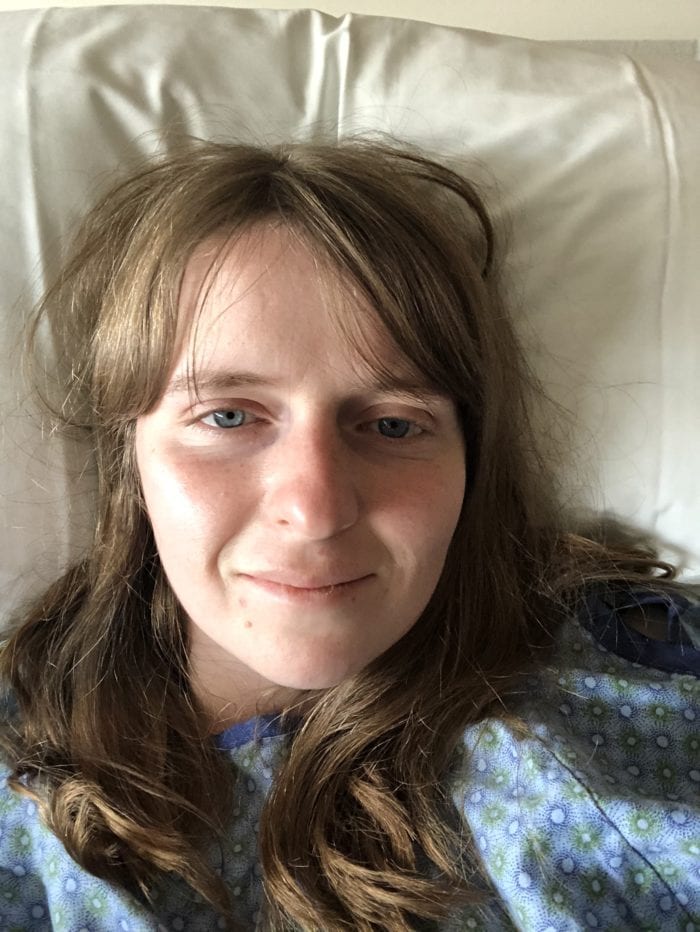
I remember waking up and hearing them say to me, “Endometriosis…and they took out some cysts.” I replied, “Did they find endometriosis?” And they confirmed they did, and I said, “Yay.” And then probably said other weird stuff. I started asking for Forrest, and they eventually brought me to a room with him.
From that point on, I was really out of it. I saw Forrest, he told me he saw my doctor who told him they “found endometriosis everywhere they expect to find it,” and then my nurse said they were going to give me Phenergan to help with nausea and to help me sleep.
If I had been more aware, I might have asked them to give me a different medication. I had this when I was pregnant with Jack, and it knocked me out for 14 hours. I was SO out of it when they gave me it in recovery. I honestly think it was a big part of why we didn’t go home that night.
I think I fell asleep for two hours before the nurse started trying to get me to eat a cracker so I could take some more pain medication (though honestly, I have no idea of the timeline. I was in and out so much). I kept falling asleep while eating that cracker. She kept telling me I had to eat it. ha ha.
At one point she said, “Well, you’ve been in recovery for a while. Do you think you’ll want to stay the night?” And I was so out of it still. I think I told her yes, but I don’t remember. She said she’d let us stay until 7ish, and then we’d have to decide.
Well, 7 came and I was still out of it. Somehow the decision was made that I was going to stay, and she said the nurse upstairs wanted me to urinate before I came up.
The nurse helped me up, and I got SUPER nauseated. I tried to go to the bathroom with no luck, and then I threw up a bunch. At that point, they took me up to the Mother/Baby Unit where I was admitted for the night.
I felt kind of dumb that I ended up staying – especially since so many go home just hours after – and with more extensive issues than I had. However, thinking back on what I can even remember, I don’t know how I could have possibly gone home. My oxygen kept dropping whenever I fell asleep, I wasn’t peeing, I felt totally out of it, and the pain meds weren’t working well. You just never know how you are going to react to surgery and anesthesia, and I think it’s important to realize that just like endometriosis is such an individualized disease (no case is the same), so is recovery.
The hospital staff was wonderful. The nurses I had were very kind and patient (even when I said ridiculous things like, “Will I ever pee again?!”). I was feeling better by the morning, and I was able to leave less than 24 hours after I arrived.
One thing I have to comment on – they put this massager-thing (no clue of its actual name) during and after surgery that massaged my legs to prevent blood clots. The nurse told me some people hate it, but I loved it! It felt like a massage. In the midst of all the other pain I was going through, that small thing helped me a lot.
What to Expect During Recovery
I am still in the midst of recovering, so I will update this later on after I’ve more fully recovered. However, just like I thought it was important to share what people don’t tell you about labor and delivery recovery, I think what I’ve experienced so far might be helpful to someone else:
Nausea
Anytime you have anesthesia, nausea is a super common side effect. I threw up a couple of hours after, and I felt super nauseated anytime I stood up for about 12 hours. Take the anti-nausea medications! The ended up giving me Zofran (instead of Phenergan), and it helped a lot.
I’ve been post-op for a few days now, but I still have bouts of nausea. In fact, sometimes it’s the worst side effect I have. I ended up calling to get a prescription for Zofran. For me, it has been more crucial than pain meds (at least after the first few days).
Urinating
They generally want to see you urinating pretty soon after surgery, and I don’t think they’ll usually let you leave if you don’t (in fact, on the discharge papers, it says if you aren’t urinating, you need to go to the ER).
I had a lot of trouble peeing after surgery. I went into surgery at 2ish, came out around 4, and I didn’t pee until 3 AM. The nurses tried putting peppermint oil by the toilet, turned on the water at the sink, and told me to blow bubbles into a water cup…but nothing worked. It was almost to the point where they would have to put a catheter in, but I was finally able to go and had no problems after that. But it was pretty brutal! It burnt for a while (probably due to the catheter placed during surgery).
What finally helped me go? Putting my hand under warm water. One of the nurses joked about it shortly after surgery, but it honestly helped the most!
Gas Pains
I was fortunately warned about this, but boy, are they painful! During this surgery, they pump your abdomen full of gas to distend it so they can see things more clearly. Although they “deflate” your abdomen afterward, you will still have residual gas…and the pain that can result is not fun!
I had it in my right shoulder, as well as in my ribs, and it just felt like I constantly had a pulled muscle. When I am laying down, my abdominal pain isn’t horrible, however, the gas pain was really bad, and I couldn’t relieve it. It’s finally gone away – but it’s seriously no joke!
I took Gas-X to help get rid of the excess gas, but the best thing you can do is get up and walk around. Obviously, after this surgery, you should be laying down a lot. But the nurse told me the fastest way to recovery is finding a balance between resting and moving, and it does help with the gas pain.
Pain
So, the hardest part of recovery – at least so far – has been the pain. I have given birth twice, and I have to say, this has been harder for me than that! I was fortunate to have two, uncomplicated vaginal births, and while I was sore, I was able to get the pain under control pretty easily.
Not so with this recovery so far. I’ve been given various pain killers, and it’s been difficult to find the right combination. I’ve never reacted well to narcotics, and while I tried Percocet for a while, it really just made me feel loopy and nauseated – and I was still in pain. I was given a prescription for Toradol, which can be used for a very short amount of time, but I feel like it helps the most of anything.
Make sure you communicate with your care team about pain. Even with the medications I’ve been taking, nothing has gotten it to go away entirely, and I’m convinced at this point the only thing that will help is time.
My pain is primarily in my abdomen. Any type of crunching movement is really painful, and if I move the wrong way, I yelp out in pain. Laughing, coughing, and sometimes even talking triggers it. But it has been getting better with each day. The incision sites actually don’t hurt that much – it’s mainly internal pain I’m feeling.
I have noticed an improvement in the lower back pain (including sciatica) that I almost always had, so I’m anxious to see how things will improve with time.
**Do not take any of my advice for what I have taken as medical advice. All medications should be carefully overseen by your physician**
Bloating/Swollen
Bloating is definitely not something people with endometriosis are strangers to – but you definitely should expect it during recovery. Your abdomen will definitely be swollen, and honestly, it’s hard to say how long that will last for. I’ve read so many different stories from different women – some who say it was gone after a couple of weeks, while others felt swollen and bloated for months.
Just know that it’s normal – drinking lots of water can be helpful!
Bleeding
You can expect some vaginal bleeding after the procedure. I really didn’t have a ton, but there was some. A lot of this will depend on what work was done and where.
Constipation
Constipation is normal as well. It’s important to relieve constipation, but it can be difficult to go when you feel so much pain. I promise, it just gets worse the more constipated you get.
I was personally advised to take a stool softener and a laxative, which I think was helpful. I’ve also resumed taking Magnesium Citrate, which is something I take regularly anyways.
Narcotics can also cause some major constipation, so be aware of that as a side effect for taking them.
Weight Gain
Weight gain after surgery can be normal – and it happens for a variety of reasons. Even though I haven’t been eating a ton, I have gained a few pounds. From what I’ve been reading, a lot of it is fluid retention, which can come from all of the fluid they pump in your body during surgery. A lot of people recommend not looking at the scale for a week or two after surgery – especially if you’re the type of person that may be feeling a little depressed after the fact.
The extra gas they pump into you may cause some issues with weight as well.
Endometriosis Surgery Recovery Time
A lot of this will depend on what you have done and your body’s response to it. However, with excision surgery, everyone I’ve talked to says to plan on laying low for 1-2 weeks.
Even then, most people say that it takes about six weeks to feel like you can return to most normal activity, and months to fully recover. It is a major abdominal surgery – so don’t rush it. Listen to your body and talk with your doctor for further instructions.
Endometriosis Surgery Cost
I have not gotten my final bill yet, but I will post later once I do. Because I use a health share, I am considered self-pay. The hospital I went to gives self-pay patients at 60% discount…but you have to pay it all up front.
The estimated amount for the surgery was around $45,000, and we had to pay $16000 up front. That was for the hospital fees alone. I have not yet received the bill for the doctor or the anesthesiologist. Health care is definitely extremely expensive in the United States. The amount you will pay will depend on your insurance coverage. Keep in mind that many people have to travel to different states or out-of-network doctors, which may or may not be covered by traditional insurance.
Tools for Recovery
Rest
It seems that the best tool for recovery from this surgery is time and rest. I’m having a hard time making myself stay down, but I know, in the long run, it will help.
Pain meds
Don’t feel guilty taking pain medications. Although there can be serious side effects to pain medications, they exist for a reason. You don’t need to suffer through the pain – work with your doctor to come up with a plan that will work best for your body. I don’t respond well to most pain medications, so this has been hard for me, personally.
TENS Machine
I have an OMRON TENS Machine that I got a few weeks ago, and it has been a literal lifesaver for me. I have been using it regularly since I received it, and it dulls the pain more than just about anything. I have been using it periodically during my recovery – especially during the times where I feel the most miserable – and it works.
The pain isn’t taken away permanently, but it at least dulls it enough for me to rest. I think everyone should know about TENS machines – there are lots available on Amazon.
Body Pillow
It can be really hard to get comfortable while recovering. For the first two days, I could only lay on my back – being on my side (which is my preferred way to sleep) was just too painful.
I have found a body pillow to be really helpful, especially with resting on my sides. I have a nice U-shaped body pillow that I really like. You can also get $50 off of this body pillow with the code CLARKS50.
Compression Socks
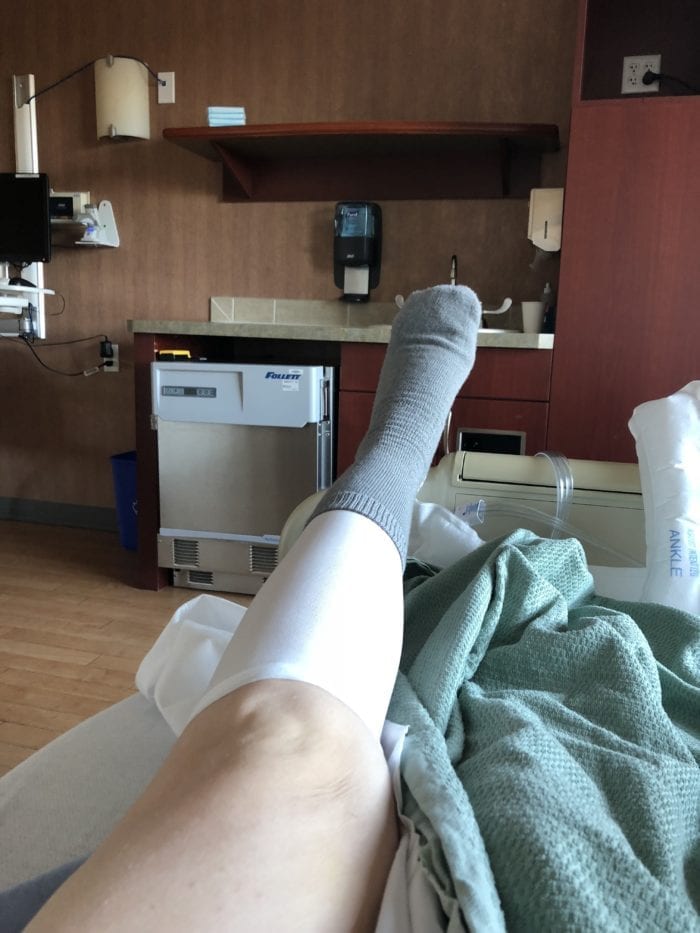
I was given compression socks as soon as I got to the hospital, and I was encouraged to take these home and wear them until I felt like I was able to get up and walk around more. These are great tools for helping you to recover more quickly.
Essential Oils
Okay, I don’t use a ton of essential oils, but I know a lot of you do. I asked my friends at Rocky Mountain Oils to recommend some that may be helpful for surgery recovery, and these are the ones they recommended:
and I would bring some peppermint oil along as well. This can help encourage you to go to the bathroom (it didn’t work for me but apparently it works for a lot of people!). It might also help with nausea as well.
What to bring
So, what should you bring to the hospital with you? I saw a packing list, and I thought it seemed a little bit crazy – though I think it may have been for people that were staying at a hotel the night before and possibly after.
For the most part, this is considered an outpatient surgery, so you don’t need to bring a lot. However, a lot of women (myself included) end up staying longer than anticipated, so it would be wise to have some extra items – just in case.
Here are some things to bring:
- ID
- Insurance Card
- Cell phone charger
- Cell phone
- Pillow
- Blanket
- Socks
- Extra underwear (unless you like that fun mesh underwear 🙂
- Panty Liners/Pads
- Extra Clothes
Things to Know
Ask questions
This is a major surgery and you have every right to know exactly what is going to happen to you. Ask lots of questions – and don’t think that anything is dumb.
Bring someone with you
As I’ve said throughout this post, I was SO out of it. I am so grateful that I had Forrest there because I would have been a total mess, and I don’t think I would have had any idea about what was going on.
You will definitely need someone to drive you home (you’ll most likely be on some kind of narcotic), but I recommend doing everything you can to have someone be with you from the start to the end of your hospital stay.
Double check instructions
I was not very good at remembering what they told me to do before the surgery, so I had to double check everything. Even when I got there, I got a little nervous when they asked the last time I drank water, and I said three hours earlier, and one of the nurses acted a little concerned. I knew I was following the instructions – and the anesthesiologist confirmed that – but it sure did make me nervous!
Drink Lots the Day Before
Because you really can’t drink too much before the surgery, a nurse told me to hydrate, hydrate, hydrate as MUCH as possible. This will help them find your veins better.
Stay Down
It is hard to stay down. I’ve had lots of people tell me how much fun it must be to just lay on the couch or in bed…but when it’s not by choice, it is not fun! Especially when you have children. But it’s so important for the healing process to take things slowly.
Ask About Recovery Instructions
This is a major surgery – you really can’t expect to be getting back to your daily schedule right afterward. Make sure you have a conversation with your care provider about what you can expect for recovery – how long you’ll need to be on bed rest, how long before you can return to work, how long most people are on pain meds for, when you can start exercising, etc.
Resources for Endometriosis
There are a lot of resources out there regarding endometriosis, and I have found that much of this disease requires you to do your research and be an advocate for yourself. There’s a lot of information out there – and not all of it is good. Here are a few resources I’ve found helpful:
Phew. If you got through all of this, I’m impressed! But I’m sure I’m not the only person out there who tried to get as much information as possible before the procedure.
Just remember that everyone has a different experience. With endometriosis, what they do during surgery depends so much on what they find – and everyone reacts differently to everything that happens. I do hope that this has given you some insight though. Feel free to ask any questions you may have. And, as always, don’t take any advice in this post as medical advice – talk with your doctor about any concerns you may have.
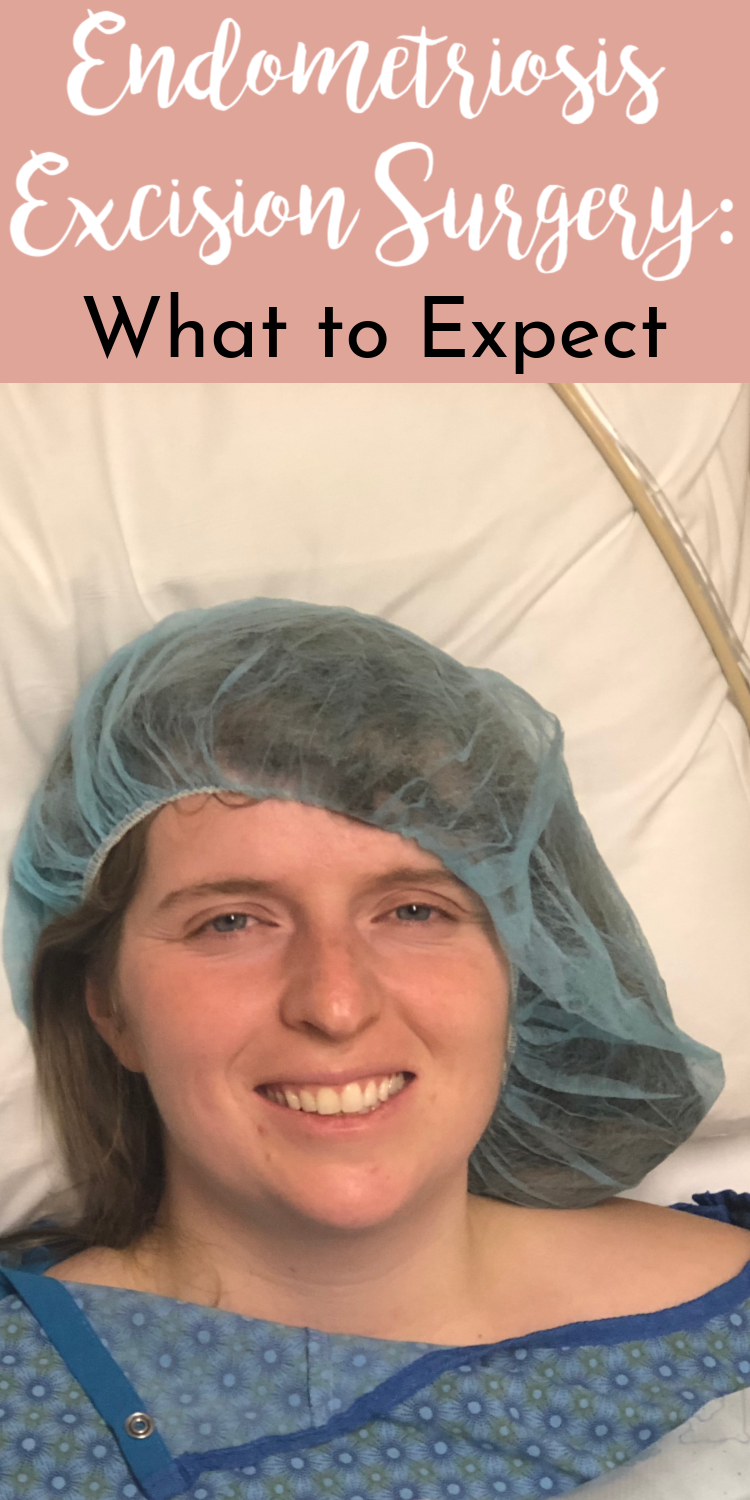

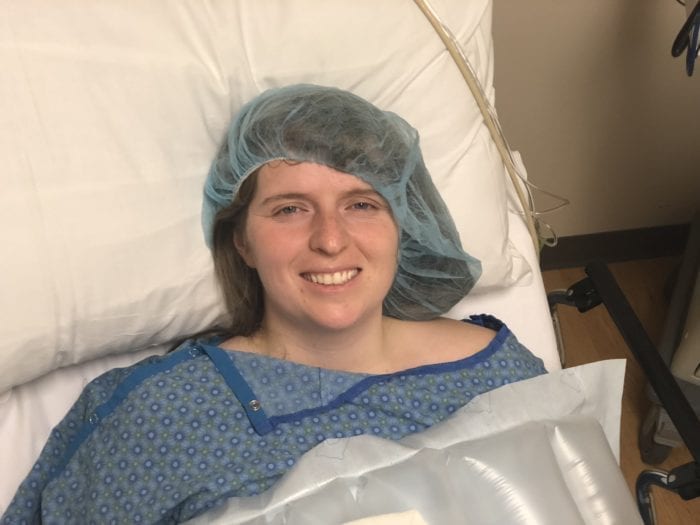


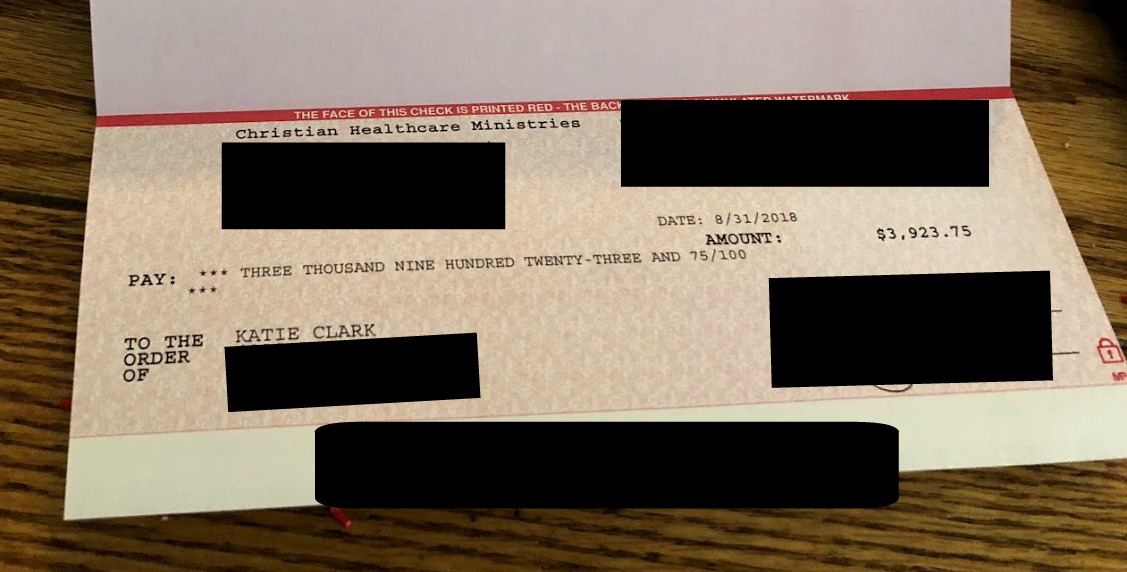



Hi Katie!
My surgery is in a little over 24 hours and this article has been incredible. The fear you had about the doctors not finding anything was so validating and comforting to know I wasn’t crazy or the only one. Thank you for your wisdom and for sharing this experience!
Hi, I live in South Africa and had excision surgery just over two weeks ago. I have been in so much pain and have been researching and doing alot of online reading and came across your blog. Thank you so much, it’s very informative and helps to know I’m not going crazy. Hope you are doing well and keeping safe.
Thank you so much for sharing your journey!
I have the same surgery, and trying to get pregnant again as I have secondary infertility.
HI, really considering excision surgery. Did you have to take antibiotics afterwards? I’m allergic to most antibiotcs.
Nope, no antibiotics.
Wow this is such a comprehensive post! And with accurate info! Thanks for sharing 🙂
Thank you! I’m glad you enjoyed it.
Hi Katie,
I found this to be very helpful. I’ve read a ton of articles and feedback on the lap surgery and this by far was one of the best. I’m scheduled to have the lap surgery on January 30th. I also have a vacation scheduled on February 5th (6 days after the surgery) to Vegas. It was something I had planned before knowing about the surgery. Do you think I should cancel?
*Cancel the Trip?
I’m so glad this was helpful. If you are recovery is similar to mine, I would definitely not go on a trip six days after surgery 🙂
Thank you, Katie!
You’re welcome! I hope your surgery goes well 🙂
This was such an informative blog post. I have my surgery next week and this has helped ease some of my anxiety. Thank you so much for taking the time to post about your experience in detail. I appreciate it so much!!!
Oh I’m so glad it was helpful. Best of luck with your surgery!
Hi, I came across your story and found it very helpful. I just had the surgery and I am in more pain than I thought I would be. The pain meds really don’t help that much. How long did your pain end up lasting?
It lasted a lot longer than I anticipated – probably about 6 weeks? After two weeks I started feeling a little better. But I was out of commission for quite some time.
Hi Katie, Hope you are still checking this. I stumbled across this blog post in my searches of endo in Colorado. Im in Denver and my insurance doesnt cover the two excision specialists on the Nook list. Could you please tell me your doctor that did Davinci here in Colorado? Also Im so curious as to what your symptoms were and how you feel now? Thank you so much. Missy McKesson
Hi, Missy! Thanks for your comment. The excision specialist I saw was Dr. Nelson in Longmont. I know a lot of girls have been able to get their insurance to cover him – search for the “Colorado Endo Girls” Facebook group 🙂 I have also heard excellent things about Dr. McGlynn at Bella Women’s for her treatment of Endometriosis. That’s where I go for my Prenatal care, and I plan to continue care there after the baby is born.
I actually got pregnant about two months after my surgery – which was a big reason why I had it. So I haven’t had a lot of time to properly assess how successful the surgery has been.
My symptoms…it seems like just about everything under the sun! Painful menstruation, painful ovulation, painful cervical checks, painful intercourse, heavy bleeding during periods (like 150 ml+), and I was suffering from secondary infertility as well, which the surgery seemed to help. Those were the main ones! Please let me know if you have any additional questions. Best of luck! It’s a hard journey but one worth pushing thorugh.
I am thrilled to see this comment and to read your experience. I have my surgery set up with Dr Nelson in a few weeks. Reading your experience, especially with it being with the same doctor that I will have as well has helped ease some of my anxiety.
I’m so happy to hear that – I hope the appointment goes well!
Currently considering surgery & knew nothing about excision. Thank you for taking the time to put this together!! Hope you’ve recovered well!
I hope that this was helpful and helps you make your decision 🙂 My recovery has been a little rough, but three months after, I’m definitely seeing benefits and am so glad I did it!
I am about to have surgery and I’m so glad you made the comment about hoping they do find endometriosis. Ive been feeling terrible for thinking that all day. This is the most helpful article I’ve read all day so thank you!
I’m so glad. Best of luck with the surgery – I hope they can find you some answers and relief <3
Hello! Thank you so much for your blog post, it was very helpful as I will be having laparoscopic surgery in one week. I was curious if Christian Healthcare Ministries covered all the bills. I was also curious if Christian Healthcare Ministries questioned you as to whether or not the surgery was related to fertility issues as I know they will not cover anything relating to fertility. My surgeon is a reproductive endocrinologist who specializes in endometriosis but he also happens to work for a fertility clinic and I didn’t know if this would be a red flag to Christian Healthcare Ministries and cause them to not cover the costs. Anyways, thanks again for the great post.
Thank you, Anna! No, they didn’t say anything. I was very thorough in my explanation form – I would suggest contacting them before though to make sure this wasn’t a problem. I think endometriosis is known well-enough for causing widespread issues, and while one of them is issues with pregnancy, it’s not the only reason I had the surgery and needed it. They were very helpful throughout the whole process!
Thank so much for the reply. I will keep looking in to it 🙂
This is such an awesome, helpful post for anyone suffering from endometriosis and considering surgery! I read almost the whole thing and I don’t even have it! Great job explaining! I’m so glad you found an answer and were able to do something about it!
I’m impressed that you read almost the whole thing! haha. Thank you – I just hope it will be helpful to someone looking for help 🙂
Oh WOW! I had no idea you were having surgery a few days after we met at the Trunk or Treat! This is such a great article, very helpful for anyone about to experience something similar! I’d love more of your advice whenever you feel up to it, but take good care of yourself for the time being!
Thank you, Alicia! I just saw your email, and I am going to respond soon 🙂